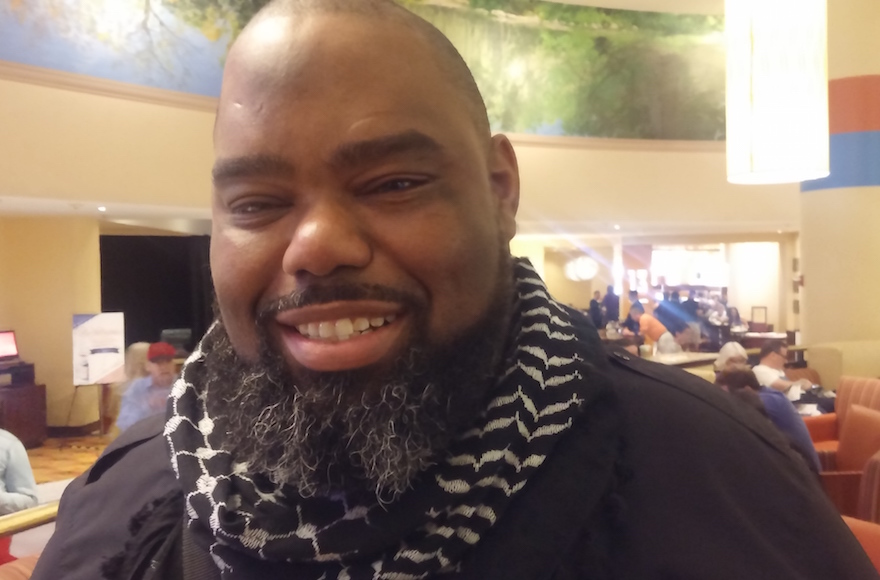Bernie Sanders’ new movement endorses candidates with a range of Israel views
Published September 1, 2016

Bernie Sanders, I-Vt., shaking hands with supporters after outlining his plan to reform the U.S. financial sector in New York City, Jan. 15, 2016. (Andrew Burton/Getty Images)
WASHINGTON (JTA) — A Florida state senator caught up in a boycott-Israel controversy. A Wisconsin state representative who combated anti-Israel bias on his campus.
ADVERTISEMENT
The diversity of Israel-related outlooks among the 63 candidates endorsed by Our Revolution underscores the eclecticism of the left-leaning movement launched last week by Bernie Sanders.
The endorsed candidates represent an opening salvo by Sanders, the Independent senator from Vermont. to build on the progressive following he earned in his unsuccessful bid for the Democratic presidential nomination.
Sanders, the first Jewish candidate to win major nominating contests, has said that he wants to transform the party from the bottom up. Of the endorsed candidates, just 13 are running for Congress. Most are running for state legislatures, and some are running for local office.
That, coupled with Sanders’ longtime focus on economic reform, means that the group’s organic emphasis is on domestic issues.
Still, Our Revolution’s issues pages list foreign policy postures close to those Sanders touted during the campaign, including a call on Israel to end settlement activity and end its blockade of the Gaza Strip, and on the Palestinians to “unequivocally” recognize Israel’s right to exist. The group also calls for the United States to remain alert to the threat Iran poses to Israel and backs the two-state solution.
When it comes to Israel issues, Our Revolution’s endorsees run the gamut.
ADVERTISEMENT
In a fundraising appeal on Wednesday, the group counted as one of its successes Dwight Bullard’s victory the day before in the Democratic primary for a Miami-Dade area state senate seat.
Bullard was the target of a pro-Israel protest over the weekend because of his participation in a tour of the West Bank earlier this year sponsored by a group that backs the boycott, divestment and sanctions movement targeting Israel. Bullard has said he is “agnostic” about BDS, but one of his opponents, Andrew Korge, said the trip was “disturbing.”

Florida State Senator Dwight Bullard wore a Palestinian keffiyeh, or headscarf, while attending the Democratic National Convention in July. (Ben Sales)
By contrast, Jonathan Brostoff, a Wisconsin state representative running for reelection, has been to Israel on the Birthright-Taglit program and led a pro-Israel group at the University of Wisconsin-Milwaukee.
“I was exposed to knee-jerk leftist anti-Israel stuff,” Brostoff told the Wisconsin Jewish Chronicle in 2008, describing how the trip converted him to pro-Israel activism. “I had a narrow range of false information regarding Israel before I went.” Jewish officials in Milwaukee said Brostoff remains strongly pro-Israel.
Another Our Revolution endorsee, Ilhan Omar, is a onetime refugee from Somalia running for Minnesota state representative. She reportedly told the Twin Cities Daily Planet earlier this year that she favored divesting the University of Minnesota of its Israel bonds. (The newspaper did not directly quote her, and JTA has asked Omar’s campaign to clarify her stance.) In the Aug. 9 primary, Omar defeated Phyllis Kahn, who is Jewish and who has held the Minneapolis-area seat for 44 years. Omar, running unopposed, will become the first Somali-born representative in the legislature.
In its appeal to donors, Our Revolution said Bullard’s victory in Florida alleviated the disappointment of its most prominent loss in backing Tim Canova, a law professor who sought to unseat Rep. Debbie Wasserman Schultz, D-Fla.
Canova, who is not Jewish but who lived in Israel for a period, attacked her for backing last year’s Iran nuclear deal, which was opposed by much of the pro-Israel community. Ironically, his campaign pitted a pro-Sanders gentile against one of the most prominent Jews in the party, premised on the accusation that she was insufficiently pro-Israel — even though Sanders also backed the Iran deal.
Sanders opposed Wasserman Schultz because he believed she thwarted him in her capacity as chairwoman of the Democratic National Committee.
Wasserman Schultz insisted she was neutral in the race, but on the eve of last month’s Democratic National Convention, a release of hacked emails showed her speaking of Sanders and the campaign in harsh terms, and she quit the party chairmanship.
Another one of Our Revolution’s losses on Tuesday was Aaron Baumann, the scion of a Jewish Arizona family, the Capins, with roots in the Tucson and Nogales area that date back more than a century.
Baumann failed to oust the incumbent state representative, Rosanna Gabaldon. (Also losing to Gabaldon was Daniel Hernandez, the congressional intern whose quick first aid helped save the life of Rep. Gabrielle Giffords, D-Ariz., the Jewish congresswoman who was shot in a 2011 spree that left six people dead.)
Other Jewish candidates endorsed by the group include Russell Feingold, attempting to wrest back Wisconsin’s U.S. Senate seat from Ron Johnson, who defeated him in the 2010 Tea Party sweep of Congress; David Zuckerman, a Vermont state senator and farmer who belongs to the state’s Progressive Party and who is running for lieutenant governor; and Jamie Raskin, a state lawmaker running for Congress in Maryland’s Washington suburbs. Altogether, at least five of the 63 endorsees are Jewish.
Our Revolution’s 11-member board, announced this week, is chaired by Larry Cohen, until recently the president of the Communications Workers of America, and Huck Gutman, a University of Vermont literature professor who is one of Sanders’ oldest friends.
Also on the board is James Zogby, the president of the Arab American Institute and a Sanders appointee to this year’s DNC platform-drafting committee who led an unsuccessful effort to include language critical of Israel’s occupation of the West Bank.















